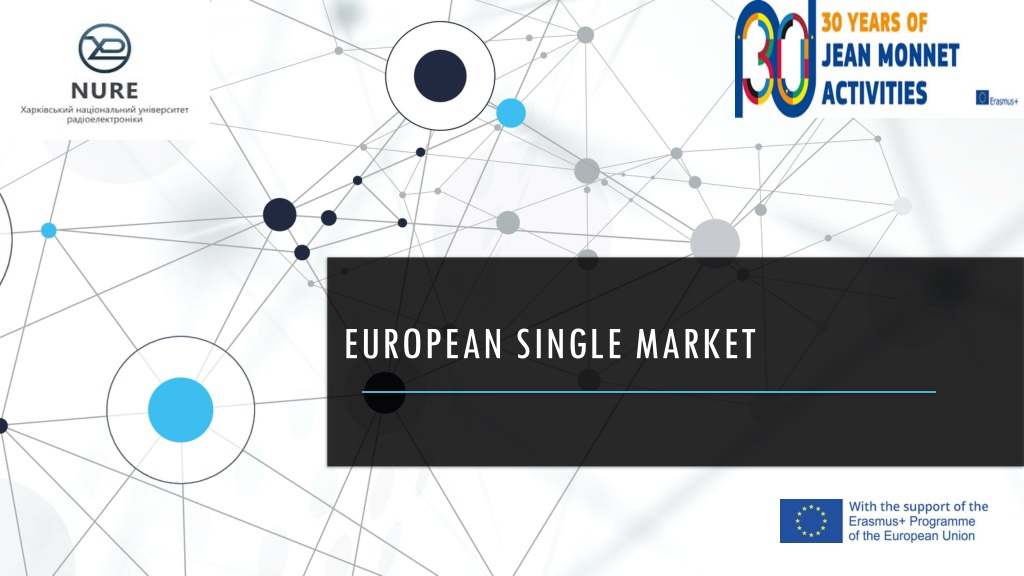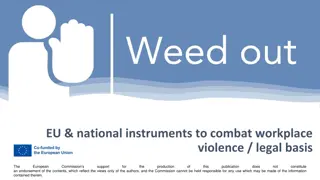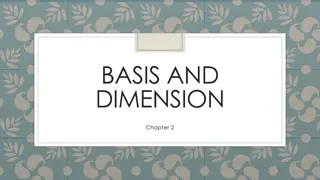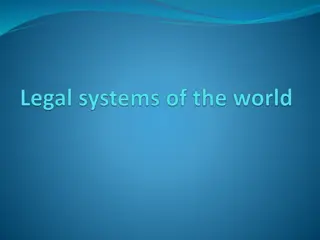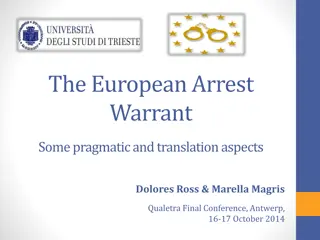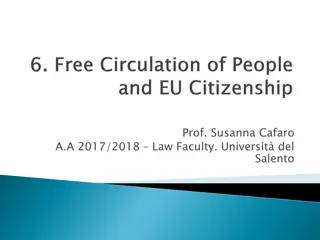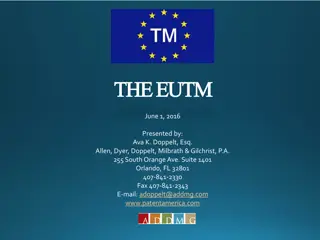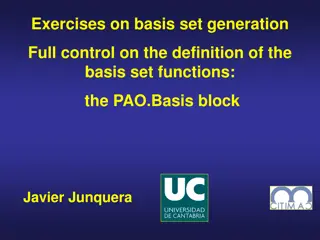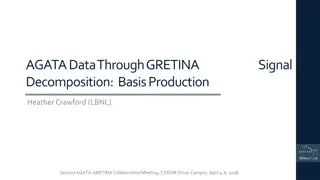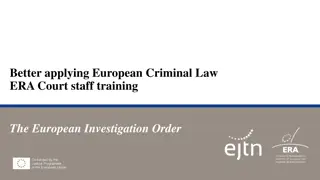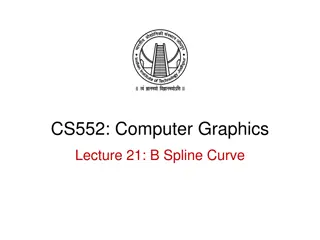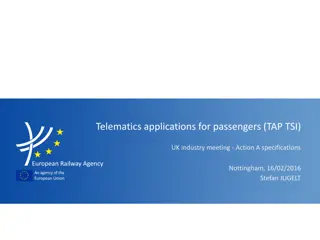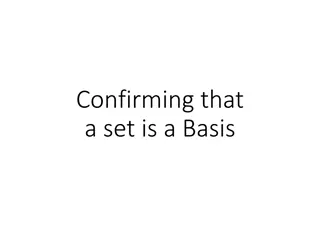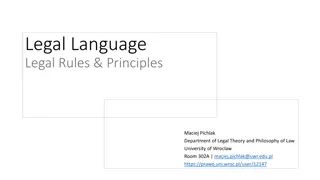Understanding the European Single Market: Terminology, Principles, and Legal Basis
The European Single Market allows free movement of goods, services, capital, and people among EU Member States and beyond. Learn about the key terminologies, principles, freedoms, and legal foundation of the Single Market as outlined in the Treaty on the Functioning of the European Union.
Download Presentation

Please find below an Image/Link to download the presentation.
The content on the website is provided AS IS for your information and personal use only. It may not be sold, licensed, or shared on other websites without obtaining consent from the author. Download presentation by click this link. If you encounter any issues during the download, it is possible that the publisher has removed the file from their server.
E N D
Presentation Transcript
INTRODUCTION European Single Market, or EU Internal Market, refers to free movement of persons, services, goods and capital from one EU Member State to another and beyond (Norway, Iceland, Lichtenstein + Switzerland). ESM offers opportunities for businesses, consumers, workers, students, administrations... ESM is an achievement of the European Union and the backbone of economic integration within the EU.
LEARNING OBJECTIVES Terminologyof ESM Principlesof theESM Freedomsof theESM ESMassharedresponsibilityof theEU&MS
EUROPEAN SINGLE MARKET Article 26 of TEU Union shall adopt measures for establishing or ensuring the functioning of the internal market Internal market shall comprise area without internal frontiers in which the free movement of goods, persons, services and capital is ensured Article 27 of TEU Commission proposals take into account effort of economies showing differences in development derogations must be of a temporary nature and cause the least possible disturbance Source: Treaty on the EU
EUROPEAN MARKET: COMMON, SINGLE OR INTERNAL? Case 15/81 Gaston Schul Douane Expediteur The concept of a common market as defined by the court in a consistent line of decisions involves the elimination of all obstacles to intra-community trade in order to merge the national markets into a single market bringing about conditions as close as possible to those of a genuine internal market. [para33]
ESM: LEGAL BASIS Articles 4(2)(a), 26, 27, 114 and 115 of the Treaty on the Functioning of the European Union (TFEU). Article 114 of the TFEU, right of the EU to approximate the laws in the Member States which have as their objective the establishment and functioning of the ESM. Approximation is intended to ensure harmonised legislation across the EU and limit regulatory differences between Member States To achieve approximation, the EU adopts harmonisation legal acts (Directives or Regulations). Directives are legislative acts that set out a goal Member States to achieve, granting to MS the freedom to decide how Regulations will be applied across the EU. A minimum harmonization requires minimum rules and EU Member States can set higher rules on top of those established in the EU legislative act. Maximum harmonization, EU Member States may not introduce rules that are stricter than those set in EU law. Source: European Parliament, 2020
FROM ESM TO COMPLETE ECONOMIC UNION Complete economic Union ? Macroeconomic coordination & Exchange rate Fiscal & tax coordination Regulatory coordination Competition & state aid Freedoms Capital goods people Services Establishment
THE EVOLUTION OF ESM 1958 common market by 1970, achieved in 1968 1987 Single European Act 300 measures to complete ESM by 1992 1993 ESM started to operate in 12 MS, towards Economic and Monetary Union (EMU) 1994 - the Agreement on the European Economic Area (EEA), step to 31 countries 1997 - Single Market Action Plan to remove remaining barriers 2010 2012 - Single Market Act I and II to improve the functioning of the ESM 2014 - Capital Markets Union & Digital Single Market
ESM MEMBERS European Single Market encompasses 31 country: - 27 EU Member States - Iceland, Norway and Liechtenstein through the Agreement on the European Economic Area (EEA) - the United Kingdom (UK) until 31 December 2020 - Switzerland is deeply integrated via more than 100 bilateral agreements
PRINCIPLES OF ESM Horizontal principles of ESM: Mutual recognition Subsidiarity Proportionality Non-discrimination
PRINCIPLES OF ESM The principle of mutual recognition established by the CJEU in its interpretation of Articles 28-30 of the EU Treaty and applied in areas that are not harmonised at EU level. - The principle was set by the CJEU in the Cassis de Dijon judgement of 1979 in relation to the free movement of goods. - For instance, a product lawfully produced and marketed in one Member State must be accepted in another given that the legislation of another Member State is equivalent in its effects to the domestic legislation. Source: European Parliament, 2020
PRINCIPLES OF ESM The principle of subsidiarity - the EU action is possible only under three preconditions, according to Article 5(3) of the Treaty on European Union (TEU): The area concerned does not fall within the Union's exclusive competence (i.e. non-exclusive competence); The objectives of the proposed action cannot be sufficiently achieved by the Member States (i.e. necessity); The action can therefore, by reason of its scale or effects, be implemented more successfully by the EU (i.e. added value).
PRINCIPLES OF ESM The principle of proportionality how the EU should act by avoiding unnecessary restrictions and guaranteeing that EU action only does what is necessary to achieve the aims of the action. Proportionality is set out in Article 5(4) of the TEU, the principle was developed by the CJEU. The Commission should undertake a subsidiarity and proportionality analysis: - analysing a new initiative in areas where the EU does not have exclusive competence - evaluating the relevance and European added value of an existing intervention
PRINCIPLES OF ESM The principle of non-discrimination a general principle in EU law which applies to ESM as well as to other areas of EU law. Article 18 of the TFEU prohibits "any discrimination on the grounds of nationality". For example, it is prohibited for MS to treat imported goods differently from domestic goods. Forms of discrimination : - Direct discrimination on grounds of nationality or residence is prohibited under Articles 56, 49, 18 of the TFEU - Indirect discrimination, a measure is not directly linked to nationality, but puts foreign actors at a disadvantage compared to local actors
GENERAL PRINCIPLES General principles of regulating ESM under the Treaty & secondary law: No restrictions No discrimination Equal treatment & equal access Mutual recognition of equivalent rules Transparency & objectivity
FREE MOVEMENT OF GOODS Articles 28-30 of the TFEU the free movement of goods provides access to MS' markets for producers and to a broad variety of goods for consumers. Principle of equivalence: a product made and marketed legally in one Member State must be allowed on the market of any other Member State. - no duties on goods produced in the EU or imported to the EU from third countries sold cross-border - no charges equivalent of a customs duty on trade - no quantitative restrictions (Article 34 of the TFEU). Any kind of restriction that directly or indirectly hinders free movement of goods is forbidden.
FREE MOVEMENT OF GOODS Key cases of the Court of Justice of the EU: - Dassonville judgment (case 8-74) - "all trading rules of Member States which are capable of hindering, directly or indirectly, intra-Community trade are to be considered as measures having an effect equivalent to quantitative restrictions - Cassis de Dijon judgment - Member States may make exceptions to the prohibition of measures having an equivalent effect to restrictions (e.g. with regard to the protection of public health etc.) - Keck judgment (C-267/91 and C-268/91) - the field of application of Article 34 of the TFEU, certain selling arrangements fall outside the scope of this Article, provided that they are non-discriminatory.
FREE MOVEMENT OF GOODS Harmonized areas
FREE MOVEMENT OF GOODS Non-harmonised areas regulated at national level - The principle of mutual recognition, the 2015/1535 notification procedure and the Articles 34-36 of the TFEU play a crucial role to guarantee the free movement of goods in these areas. - The mutual recognition applies to the extent that the requirements in Member State A achieve the same level of protection (of, for example, consumers, public health or the environment) as in Member State B. if Member State B requires a higher level of protection, it may require additional tests and procedures on top of those that the product complies with in Member State A, so long as the additional requirements are objectively justified and proportional. - Regulation (EU) 2019/51548 sets out the rights and obligations in relation to the mutual recognition principle for competent authorities and businesses when selling goods in another EU Member State Source: European Parliament, 2020
EXCEPTIONS Art 36 is applied when there are no harmonising measures, for protection of - public morality - public policy - public security - health & life of humans, animals & plants - industrial & commercial property Any protective measures have to be in general interest, necessary, proportional& applied in non-discriminatory manner [Cassis de Dijon, C-120/78]
HOW TO APPLY EXCEPTIONS How to test compatibility with the Treaties? A three-step approach of CJEU: 1. a restrictive justification test (overriding reasons of public interests) 2. a non-duplication test (for statutory conditions, if equivalent, already satisfied in the home country) 3. the proportionality test (barriers should be indispensable and the least restrictive Source: CJEU
HOW TO APPLY EXCEPTIONS Source: Nicolaides, 2017
FREE MOVEMENT OF PERSONS Article 45 Freedom of movement shall entail abolition of any discrimination based on nationality between workers of the Member States as regards employment, remuneration and other conditions of work and employment Subject to limitations justified on grounds of public policy, public security or public health Does not apply to employment in the public service
FREE MOVEMENT OF WORKERS No barriers for free movement of workers [e.g. taxes, authorisations, licensing, right to look for job, reside freely, access to social insurance & health care, choice of establishment, temporary, permanent, etc]. Economically active people: - Free movement of workers job seekers, employees - Free movement of services & right of establishment - posted workers, self- employed Economically inactive: - free movement of persons students, retired, family members
FREE MOVEMENT OF WORKERS Posted workers Posting of Workers Directive, even though workers posted to another country are employed by the sending business and subject to the law of the home Member State, they are entitled to a set of core rights in the host Member State. These rights include: minimum rates of pay, maximum work periods and minimum rest periods, minimum paid annual leave, the conditions of hiring out workers through temporary work agencies, health, safety and hygiene at work, and equal treatment between men and women.
RIGHT OF ESTABLISHMENT The right of establishment the right to carry out and pursue activities as a self-employed person and to set up and manage undertakings for a permanent activity of a stable and continuous nature, under the same conditions as those laid down by the law of the Member State concerned regarding its own nationals. - No discrimination of a business from MS A if it seeks to establish itself in MS B - A business from MS A should follow the applicable rules and regulations of the host MS B.
RIGHT OF ESTABLISHMENT Article 49: Restrictions on freedom of establishment are prohibited Freedom of establishment includes right to take up and pursue activities as self-employed persons and to set up and manage undertakings Article 51: Does not apply to activities which are connected, even occasionally, with exercise of official authority Article 52: Special treatment for foreign nationals on grounds of public policy, public security or public health Article 54: Companies or firms having their registered office, central administration or principal place of business within EU shall be treated in same way as nationals of MS Article 55: MS shall accord nationals of other MS same treatment as their own nationals as regards participation in capital of companies or firms
FREE MOVEMENT OF SERVICES European Single Market for services two core freedoms: the freedom to establish a business in another EU Member State and the freedom to provide or receive services in an EU Member State other than the one where the business or consumer is established (Articles 49 & 56 of the TFEU). no restrictions to carry out an economic activity in a stable and continuous way in another Member State (right of establishment, Article 49 of the TFEU); offer and provide their services in other Member States on a temporary basis or provide them from their country of origin (freedom to provide services, Article 56 of the TFEU); a person providing a service may temporarily perform his activity in another Member State, under the same conditions as those imposed by that Member State on its own nationals. Discrimination on the grounds of nationality is prohibited.
FREE MOVEMENT OF SERVICES Services are normally provided for remuneration in so far as they are not governed by the provisions on freedom of movement for goods, capital and persons Service provider may temporarily pursue his activity in another MS, under same conditions as are imposed by that State on its own nationals Article 56: Restrictions on freedom to provide services within EU shall be prohibited Article 57: Article 62: The provisions of Articles 51 to 54 shall apply [i.e.: exceptions on grounds of public policy, public security or public health] not for activities connected with official authority
FREE MOVEMENT OF CAPITAL Article 63: All restrictions on the movement of capital and on payments between MS and between MS and third countries shall be prohibited Article 65: MS may distinguish between taxpayers who are not in the same situation with regard to their place of residence or with regard to the place where their capital is invested MS may take measures to prevent infringements in field of taxation and prudential supervision of financial institutions or to take measures justified on grounds of public policy or public security These measures and procedures shall not constitute arbitrary discrimination or disguised restriction
ESM AS A SHARED RESPONSIBILITY OF EU & MS Source: Nicolaides, 2017
ESM AS A SHARED RESPONSIBILITY OF EU & MS Article 4 (3) TEU: MS shall take all appropriate measures to ensure fulfilment of the obligations arising out of this Treaty or resulting from action taken by the institutions of the Union - They shall facilitate the achievement of the Union s tasks - They shall abstain from any measure which could jeopardise the attainment of the Union s objectives
ESM AS A SHARED RESPONSIBILITY OF EU & MS Treaty provides five different types of action where national measures/policies diverge: - Approximation of national measures [and / or minimum requirements] - Harmonisation of national measures [essential requirements] - Elimination (liberalisation) [of barriers/discrimination] of national measures Coordination of national measures [technical standards] - Cooperation between MS authorities [SOLVIT]
ESM AS A SHARED RESPONSIBILITY OF EU & MS Gold-plating refers to the practice of national legislators to enhance the requirements of measures introduced at a level beyond that which is required by EU law. - where a measure is deregulatory in an area of national sensitivity (e.g. tax or financial stability), national parliaments may introduce requirements and restrictions which inhibit (or prevent entirely) the effective implementation of that law on the ground. - extending the scope of the substance of the measure, wider domestic terms than required by EU law, and proscribing sanctions or reporting requirements that increase the overall regulatory burden and make implementation of EU law more difficult. Source: European Parliament, Briefing on Challenges in the implementation of EU Law at national level, 2018
CONCLUSIONS Completion of ESM continues, it reflects the level of integration of MS - MS must remove all restrictions - MS may regulate only where there is no secondary law - MS measures can only set essential requirements and must be necessary, proportional & non-discriminatory However Excessive re-regulation at EU level & non-respect of subsidiarity Slow & complex procedures & weak implementation at national level Remaining or new barriers
THANK YOU FOR YOUR ATTENTION! maksym.kolisnyk@nure.ua maksym,kolisnyk
